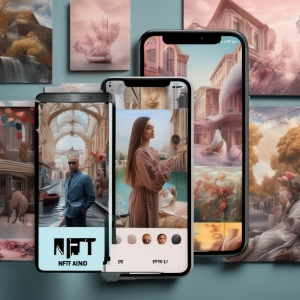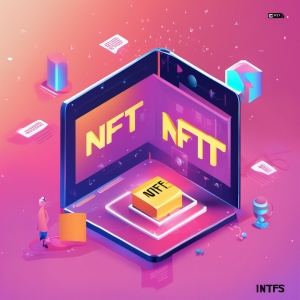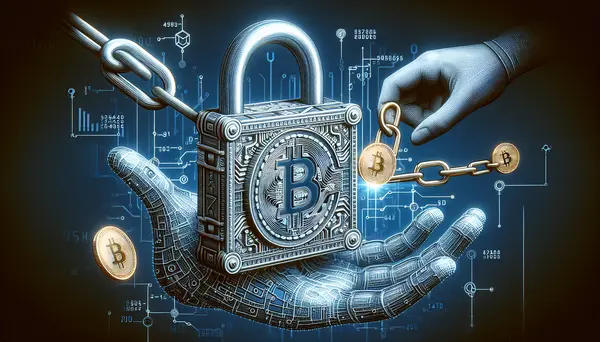Table of Contents:
Intro: Unleashing the Power of NFTs
Non-Fungible Tokens, also known as NFTs, are conquering the digital realm. Differentiating itself from standard cryptocurrencies, these digital unique assets hold an unchartered potential that's waiting to be harnessed. This article illuminates what NFTs are, how they work, and the value they offer. Inclusive of extensive insights from industry experts, this guide will provide a comprehensive understanding of NFTs' multidimensional benefits to both creators and consumers. Let's delve deep into the fascinating world of NFTs and discover how you can unlock their power for your advantage.
Understanding NFTs: A Simple Explanation
First, let's break down the term NFT. Non-Fungible Tokens are unique digital assets residing on a blockchain. Being non-fungible means each token is one-of-a-kind and can't be replaced with something else. This is in contrast to fungible tokens like Bitcoin or Ethereum, where each token is identical to all other tokens.
The Best Mining Providers at a Glance
» Infinity HashFrom our perspective, currently the best mining provider on the market. With the community concept, you participate in a mining pool completely managed by professionals. A portion of the earnings are used for expansion and maintenance. We've never seen this solved as cleanly anywhere else.
» Hashing24A well-known and established cloud hosting company. With a good entry point and in a good market phase, a good ROI can also be generated with some patience. Unfortunately, we see the durations as a major drawback.
Think of NFTs as digital collector's items. Like a signed baseball card or a unique piece of art, each NFT has value because it is the only one of its kind. They can represent anything digital, including art, music, games, or even real-world assets.
The Birth of NFTs: A Brief History
In 2017, the world was introduced to NFTs through a game called "CryptoKitties". It is a blockchain-based game that allows players to purchase, collect, breed, and sell various types of virtual cats. Each CryptoKitty is distinct, holding its unique DNA and cannot be replicated, which makes it an NFT.
Since then, the NFT market has exploded, influencing various sectors. From famous artists like Beeple making millions by selling digital art pieces as NFTs, to Twitter co-founder Jack Dorsey selling his first-ever tweet as an NFT for over $2 million, NFTs have unquestionably made a significant impact. This experimental technology has now become a mainstream investment tool within the world of cryptocurrencies.
How do NFTs work? The Technology Behind

At the root of NFTs' operation lies a cryptographic technology called the blockchain. Blockchain is a decentralized digital ledger that records transactions across many computers in such a way that the recorded transactions cannot be altered retroactively. This means that the history of any NFT, including every buy and sell, is stored forever on the blockchain. This is a significant backbone feature of NFTs that ensures the transparency, authenticity, and provenance of digital assets.
Primarily, NFTs are part of the Ethereum blockchain. Ethereum is a cryptocurrency, like bitcoin or dogecoin, but its blockchain also supports these NFTs, which store extra information that makes them operate uniquely. It is worth noting that though Ethereum is the most popular blockchain for NFTs, other blockchains like Binance Smart Chain, Flow, and Tezos also facilitate NFT transactions.
Essentially, NFTs are bought, sold, and traded on different online marketplaces like OpenSea, Rarible, and NBA Top Shot, where people can procure an NFT with Ethereum or other specified cryptocurrencies based on the blockchain being used. Once you buy an NFT, proof of ownership is inscribed in the digital ledger and a digital certificate of authenticity is provided. It's this detailed record that sets NFTs apart in the digital world, providing transparency and proof of authenticity that is often elusive online.
The Unique Attributes of NFTs
In the wide panorama of digital assets, NFTs stand out due to their unique attributes. The first and most distinct attribute is their indivisibility. Unlike cryptocurrencies that can be broken down into smaller units (like bitcoins to satoshis), NFTs are indivisible. They exist and are bought, sold, and traded as a whole.
The second key attribute is their rarity. Each NFT is different from every other NFT, even within the same project or series. This scarcity can drive value, especially for NFTs that are part of a limited collection.
Next comes the attribute of ownership. When you buy an NFT, you gain ownership rights over a unique piece of data on the blockchain. It's like owning a one-of-a-kind piece of art! Ownership of NFTs is verified via blockchain's decentralized ledger system, making it transparent and immune to fraud.
Another vital attribute is the immortality of NFTs. Once an NFT is created, it can't be deleted or destroyed because it's stored on the blockchain. This permanence guarantees the lasting legacy of an NFT.
Lastly, NFTs bring in the attribute of Interoperability, which refers to the ability of NFTs to be bought, sold, and traded across various platforms. This expands the reach and potential marketplace for NFTs.
The Value of NFTs: Why Are They Important?

NFTs offer a unique value proposition in various ways, demonstrating their ever-growing importance in the digital world.
One of the foremost is their ability to democratize art. Creators, specifically digital artists, often had a hard time monetizing their work online, especially due to issues like plagiarism and unauthorized replication. However, with NFTs, artists can mint their digital work as an unique token, thus assigning provenance and value to it. These NFTs can be sold, and artists can collect royalties every time their artwork is resold, creating a new revenue model.
NFTs also hold value in terms of digital ownership. By buying an NFT, one essentially purchases the ownership of a unique piece of data. This applies to a wide range of digital assets, from social media posts to virtual real estate. Ownership rights of these items, secured on the unchangeable and transparent blockchain, can command significant value.
Furthermore, NFTs have opened the doors to the virtual goods market within gaming and entertainment. Gamers can truly own and trade in-game items, equipments and characters, potentially making money while participating in the gaming economy. Likewise, fans can acquire exclusive content or merchandise of their favorite music artist or sports star as NFTs, elevating their fan experience.
Last but not least, NFTs have the potential to innovate traditional industries. From real estate to intellectual property rights, tokenizing physical assets could streamline transactions and cut down unnecessary intermediaries. The possibilities for NFTs usage are only limited by one's imagination.
Use Cases of NFTs: From Art to Real Estate
NFTs have been making a considerable impact across different sectors, showing a broad array of uses. One of the most prominent applications is in the field of digital art. An NFT allows artists to sell their work directly to consumers over the internet without the need for galleries or auction houses, thus disrupting the traditional art market. This decentralization empowers creators and rewards their talent fairly, marking a significant shift in the digital art world.
Apart from transforming the art scene, NFTs are also creating profound changes in the music industry. Musicians and bands can bypass traditional distribution channels and release songs, albums, or even exclusive content directly to their audience as NFTs. They not only provide artists with a new revenue stream but also reinvent fan engagement by offering unique and collectible content.
In the gaming sphere, NFTs allow players to truly own in-game items ranging from skins and weapons to virtual lands. Unlike traditional game items that are saved on individual game servers, these NFT items are preserved on the blockchain, meaning gamers can trade them outside of the game environment. This innovation enhances gameplay experience and brings real-world value to virtual interactions.
Moreover, NFTs are expanding beyond digital boundaries into the realm of real estate. A new breed of virtual real estate platforms is enabling the buying, selling, and trading of digital land as NFTs. As with physical real estate, the value of digital land parcels can increase over time depending on factors like popularity and development surround the land.
This array of applications illustrates how NFTs are not just another crypto fad, but a revolutionary technology with the potential to redefine our digital lives.
The Future of NFTs: Trends and Predictions

As we step further into the digital era, NFTs are certainly making waves as the next big thing. But what does the future hold for these unique digital assets?
Firstly, there is a growing trend towards the use of NFTs in the entertainment and music industry. Many artists and musicians are already embracing NFTs as a way to sell their work directly to fans and retain more profit. Recording artists like Kings of Leon, Grimes, and 3LAU have made millions by selling albums and concert tickets in the form of NFTs, a trend that is likely to continue as the technology becomes more mainstream.
Another prediction is that NFTs will play a significant role in the Virtual Reality (VR) and Augmented Reality (AR) world. As we move towards a more immersive digital experience, NFTs can become the basis for ownership and exchange of virtual property, enhancing the user experience.
Further, we can expect an increase in the implementation of NFTs within gaming platforms. NFTs can give gamers the ability to truly own in-game assets and even earn a living through virtual economies. Cryptokitties and Axie Infinity are early examples, but the potential is immense for more gaming platforms to adopt this technology.
Lastly, as clarity on regulations and standards around NFTs improves, we will likely see an increased adoption of NFTs in real estate and financial sectors. Tokenization of physical assets can provide unprecedented levels of liquidity and accessibility, opening up new investment opportunities.
All these predictions involve a high level of speculation, given the nascent stage of this technology. However, one thing is certain - NFTs potential hasn't been fully harnessed yet, and they are here to stay, paving the path towards a more decentralized economy.
Getting Started With NFTs: A Step-By-Step Guide
The world of NFTs can seem daunting at first, with its new technology and digital terminology. However, with the right steps, you can comfortably navigate through it. Let's breakdown the process to make your maiden NFT purchase.
Step 1: Set Up a Digital Wallet
To get started with buying or selling NFTs, you'll first need a digital wallet compatible with the marketplace you are considering. Look for wallets like MetaMask that support Ethereum, the blockchain most well-liked for NFT transactions.
Step 2: Purchase Some Ether
Once your wallet is set up, you'll need Ether (ETH), the native cryptocurrency of Ethereum blockchain, to make purchases. You can buy Ether from popular exchanges like Coinbase or Kraken and then transfer it directly to your digital wallet.
Step 3: Choose Your NFT Marketplace
After securing your wallet and purchasing Ether, the next step is to choose the appropriate NFT marketplace. This largely depends on what kind of NFTs you are interested in. Well-liked marketplaces include OpenSea, Rarible, and NBA Top Shot.
Step 4: Navigate the Marketplace
After choosing your marketplace, take enough time to navigate through it. You can search for specific NFTs, explore different categories, and even follow your favorite creators. Remember, the more information you gather, the better your buying decision will be.
Step 5: Making a Purchase
Once you’ve found an NFT you wish to own, simply click on it for a detailed view. If you agree with the listed price, click on the “Buy Now” button. Follow on-screen instructions, confirm the transaction in your digital wallet, and voila, you now own an NFT!
Keep in mind, owning an NFT bestows you with verified ownership rights but remember to respect the intellectual property rights of the original creator of the digital asset. NFTs open a new world of digital collectibles and investment opportunities. It's up to each one of us to navigate responsibly within it.
Conclusion: The Infinite Possibilities with NFTs
In sum, NFTs represent a pioneering frontier in digital ownership, trading, and creative expression. As we've discovered, their uniqueness, authenticity, and proof of ownership are what create their inherent value. This new form of digital asset has already begun transforming various industries, including art, gaming, real estate, and even the world of sports.
While the full potential of NFTs is yet to be realized, the possibilities are both exciting and infinite. They offer a new platform for creators to monetize their works in a novel way and a unique ownership proposition for collectors and investors. It is, however, important to approach with informed prudence, given the dynamic and speculative nature of the market.
As NFTs continue to evolve and revolutionize the digital space, it's crucial to keep abreast with their latest applications and impacts. Our understanding of what constitutes value and ownership is being challenged and broadened by NFTs, making them an exciting space to watch. In conclusion, we are only witnessing the beginning of a promising journey with NFTs, a journey believed to unlock untold opportunities in the near future.
Unlocking the Potential of NFTs: A Comprehensive Guide
What is an NFT?
NFT stands for Non-Fungible Token. Unlike cryptocurrencies such as Bitcoin or Ethereum, which are fungible and can be exchanged on a like-for-like basis, NFTs are unique and can't be exchanged like for like.
Why are NFTs important?
NFTs have gained popularity due to their ability to prove ownership of a digital asset. This opens up new possibilities for buying, selling, and trading digital assets on a blockchain network.
What can NFTs be used for?
NFTs can be used to represent ownership of a wide range of assets, such as artwork, music, virtual real estate, digital goods, and more.
How do NFTs work?
NFTs are created on a blockchain, which is a decentralized and transparent network, providing proof of ownership and authenticity. A unique identifier and metadata, which provide information about the asset, are built into each NFT.
How can one acquire NFTs?
NFTs can be acquired in various ways, including directly buying them from creators, from marketplaces, through trading with others, or by creating your own.










